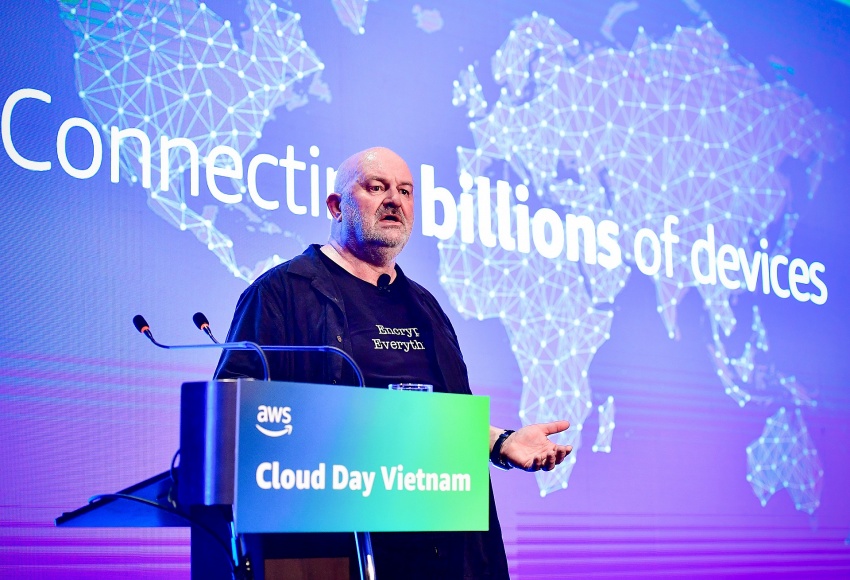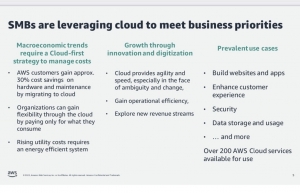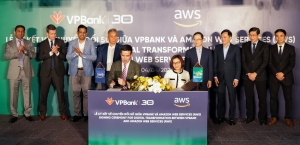Cloud technology thriving in Vietnam
In your predictions for 2023 and beyond, there are the top five tech trends. Are they the same in Vietnam?
If I look at the supply chain in the United States, it is relatively different to that over here. In the US, it's much more focused on autonomous trucking, making sure that the huge distances in the country can be covered by autonomous trucks, which removes a lot of the pressure. Here in Vietnam, it is different. It's much more about the last mile. So, companies like Ahamove, a Vietnamese on-demand logistics service that brokers between e-commerce firms and customers, are more important.
 |
| Werner Vogels, CTO at Amazon, at Cloud Day Vietnam held in Hanoi in early April |
For other predictions, like simulation and cloud technologies, those are patterns that are country-independent. For example, silicon goes together with smart energy and sustainability. At AWS, we have the goal to be carbon-neutral by 2025, and we are well on the way to actually achieving that. We are the largest purchaser of renewable energies in the corporate world, but we also have 400 projects going on ourselves to actually bring renewable energy to the masses.
I think a critical part of that is not just the generation of renewable energy, but how can we store it. At night, the sun does not shine, so if you are dependent on solar energy, you should be able to charge your systems during the day and use it at night.
There are very interesting concepts available, for example, storing energy in big mines via compressed air or by moving water up a hill and then using the potential energy later on the way down. Here in Vietnam, that is critical because I believe that we will see communities wanting to store their energy locally and retrieve that first.
In the past, if you had your own solar panels on top of your roof, you would send any excess energy back into the national grid, but what we are seeing with new storage technologies for energy, you can store this locally. We see many more community-based energy storage solutions arriving.
How can these tech trends impact digital transformation and business performance in the future?
Traditional companies are all looking to go through digital transformation. In Vietnam and around Southeast Asia, startups are thriving. There is a culture around small- and medium-sized enterprises where everybody has an idea about how to build a sustainable business. I think there is a slight difference between what we see in Western Europe and in the US, where every startup wants to become a Unicorn.
For example, I see many startups that are more interested in building long-term sustainable businesses. Now, Vietnam has several almost-unicorns here. Amanotes, a Vietnam-headquartered music game developer, is on its way to becoming one with over 90 million downloads. And, as you can imagine, companies like Amanotes would never be able to do this on their own infrastructure.
The rise of young businesses, especially startups, is really driven by cloud computing. On AWS, they can prove their concept first and demonstrate to investors that they have a very viable business. So without cloud at the base level for them, many of these companies would not be able to gain customers. This is critical in Vietnam, as the funding circuit is not as rich as in some other countries. As such, being able to be humble and start off with a minimum amount of investment is key.
AWS has recently announced local zones in Hanoi and Bangkok, and the pre-announcement of the AWS Asia-Pacific (Bangkok) Region. What’s next for AI, machine learning, and these recent announcements in Vietnam?
One of our biggest drivers is to bring cloud computing closer to our customers. And that will become more and more important as many of them rely on very low latency for their web applications.
A very significant part of that is also the ability to have access to customs. For example, if you look at machine learning, traditionally these data sets would be trained on what's called GPUs that are very power hungry and not very sustainable. So, we started developing our own chips to be able to reduce both cost and energy.
Bringing these AWS Infrastructure Regions to Southeast Asia means that customers have much lower latency access to these technologies, and they can run these machine learning algorithms and models much closer to their customers. That will be a major driver because this custom silicon gives them a much lower sustainability footprint, and it is an essential aspect of saving energy.
Vietnam plans to commercialise 5G this year. What new technology or products does AWS have that are aligned with 5G and can better support its customers?
We have a product called AWS Wavelength that embeds AWS Compute and storage services within 5G networks, providing mobile edge computing infrastructure for developing, deploying, and scaling ultra-low-latency applications as close to their customers as possible. Instead of having to separately connect to 5G access points and the Internet separately, we can now put these services in place for our 5G customers. For that, we are closely working with different telco providers to offer them these services.
Like anywhere else in the world, we listen closely to our customers and move fast to make sure that we can address their needs. We understand, for example, that the way business is being done in Vietnam might be different from how it is happening in China, India, South America, Western Europe, or the US. As such, we have teams on the ground the whole time to make sure that we educate all of our service owners to build their services in a way that meets the requirements of customers around the world.
For example, we're building different services for Japan and for Brazil. We continue to listen to our customers to make sure that we are delivering what they really require. For Vietnam, the AWS Local Zone that’s coming to Hanoi is the first step for customers to store data locally here with low latency access, and then we will take it step by step.
Amidst the global acceleration of digital transformation, the role of CTOs is now more important than ever. What are your main challenges? And what is the key to your success?
I have been at AWS for over 18 years. If I look at some of my early days when I joined Amazon – after all, I am CTO for all of Amazon, not just for AWS – in the early years, we were much more focused internally on big technology projects, and not necessarily as focused on talking to people outside, but we became a technology provider. The role of a CTO has changed to become more of an external facing technologist, listening to customers and understanding what their problems are.
 |
| For Vogels, continuing to be curious and eager to learn are the keys to his success |
Amazon has always had the goal to be the world's most customer-centric company, and it's easy to see how it works. But if you think about AWS, when we started, we thought, how can we become the Earth's most customer-centric IT provider?
For that, we needed to change a few things very radically. For example, as much as I am proud of all the technology that we have developed in AWS, the most significant change has been the change of the economic model. Before that, as CTO of Amazon, I had to write massive checks if I wanted to buy database licences. We had to think about how much we needed in five years' time because I have to make very long-term contracts to get the price down.
The vendor was in charge, so it did not feel customer-centric. When we started AWS, we decided to change those rules where the customer should be in charge. They should only be charged afterwards for what they have used. This is a really normal model. This change in economic model has been a driver for cloud computing to become as big as it is now.
For me personally, continuing to be curious and eager to learn are my keys to success. At Amazon, we have leadership principles that drive the company. Take Dive Deep, for example. In order to Dive Deep as an executive, you need to continue to educate yourself. You cannot just sit back and do nothing. One afternoon a week, my telephone and e-mail goes off, and I spend half a day learning, whether that is reading academic papers or experimenting with the latest AWS services. You need to set time aside to continue to educate yourself because the technological world is moving so fast, it is easy to become old and forgotten.
 | Vietnam’s SMEs to get credit pack from AWS Lift Small- and medium-sized enterprises (SMEs) are expected to receive financial support from AWS to begin their digital transformation journeys. |
 | VPBank signs with AWS to improve customer experience VPBank on April 4 announced the signing of agreements with Amazon Web Services, selecting it as its preferred cloud provider to build digital banking experiences for its customers. |
 | AWS dreaming big for Vietnam’s cloud aspirations Amazon Web Services is expanding in Vietnam to tap into growing demands for cloud computing. Conor McNamara, managing director for ASEAN at AWS, talked to VIR’s Bich Thuy about the future of the market. |
What the stars mean:
★ Poor ★ ★ Promising ★★★ Good ★★★★ Very good ★★★★★ Exceptional
Themes: Digital Transformation
- PM sets five key tasks to accelerate sci-tech development
- Ho Chi Minh City launches plan for innovation and digital transformation
- Dassault Systèmes and Nvidia to build platform powering virtual twins
- Sci-tech sector sees January revenue growth of 23 per cent
- Advanced semiconductor testing and packaging plant to become operational in 2027
Related Contents
Latest News
More News
- Digital shift reshaping Vietnam’s real estate brokerages (December 31, 2025 | 18:54)
- Allen & Gledhill recognised as Outstanding M&A Advisory Firm (December 18, 2025 | 14:19)
- Inside Lego Manufacturing Vietnam (December 18, 2025 | 11:45)
- The next leap in Cloud AI (December 11, 2025 | 18:19)
- Vietnam’s telecom industry: the next stage of growth (December 11, 2025 | 18:18)
- Five tech predictions for 2026 and beyond: new era of AI (December 11, 2025 | 18:16)
- CONINCO announces new chairman and CEO (December 10, 2025 | 11:00)
- How AWS is powering the next-gen data era (December 09, 2025 | 13:14)
- Outlook in M&A solid for Singapore (December 08, 2025 | 10:31)
- Vietnamese firms are resetting their strategy for global markets (December 05, 2025 | 17:04)

 Tag:
Tag:

























 Mobile Version
Mobile Version